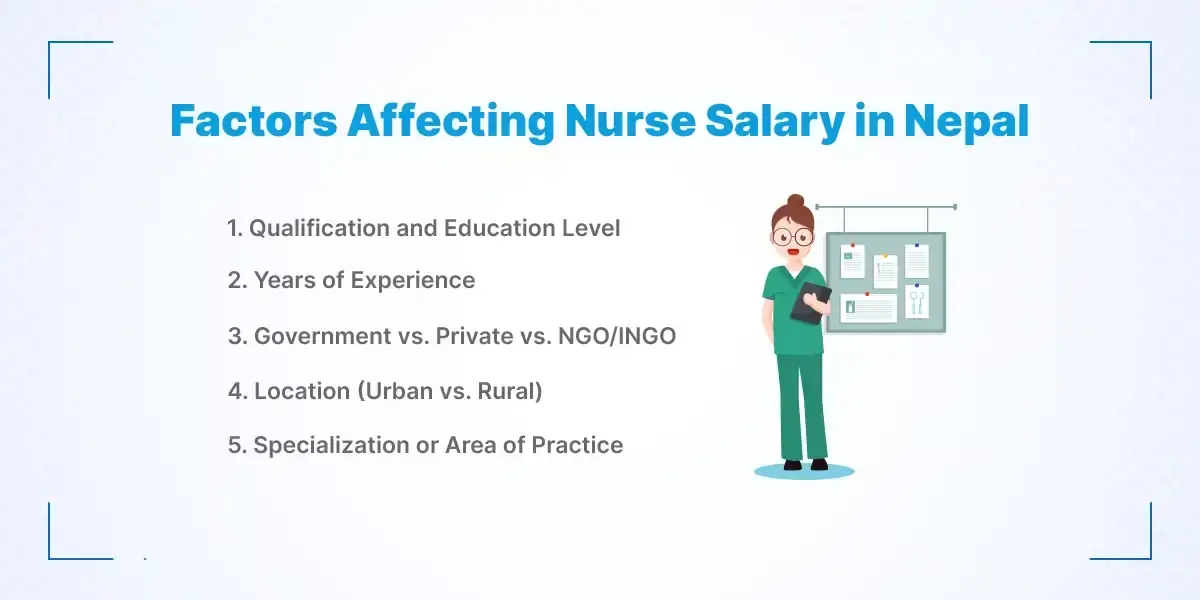
Have you ever wondered how much Nepali nurses really earn in 2025? Nursing is an honorable and critical profession in our healthcare system. Yet many individuals have no idea about the salary of nurses in Nepal. With more young adults considering nursing as a career, understanding what the pay scales are is important, not just for future employees but for those who are already working too.
In this blog, we’ll break down the latest nurse salaries based on different qualifications, experience levels, and workplaces. You’ll also learn about additional benefits, career growth opportunities, and how nursing pay in Nepal compares with that abroad. By the end, you’ll have a clear picture of what to expect and how to plan your nursing career smartly in 2025.
In this blog
- What is the Average Salary of Nurse in Nepal in 2025?
- Salary by Qualification and Experience
- Factors Affecting Nurse Salary in Nepal
- Additional Benefits Beyond Basic Salary
- Is Nursing a Good Career in Nepal in 2025?
- Nursing Salaries in Nepal vs. Abroad
- What are the Career Growth Opportunities for Nurses in Nepal?
- Conclusion
- Frequently Asked Questions
What is the Average Salary of Nurse in Nepal in 2025?
In 2025, the average monthly salary of a nurse in Nepal ranges from NPR 25,000 to NPR 60,000, depending on qualifications, years of experience, and the location of work. This amounts to a yearly salary of usually between NPR 300,000 and NPR 720,000.
If we look back a few years, the nurses' salaries have been increasing steadily. For example, in 2020, the average monthly salary was approximately NPR 15,000 to NPR 45,000. So, the salaries of the past five years have increased somewhat. This consistency is essential since nursing is becoming increasingly important for Nepal's healthcare sector.
A major cause of this increase is the increased demand for healthcare personnel, particularly after the challenges introduced by the COVID-19 pandemic. Healthcare organizations and hospitals now better appreciate the value of nurses and are improving pay to retain and attract skilled staff.
Another contributing factor to salary hikes is inflation and the overall economic changes in Nepal. As the cost of living rises, salaries should also rise to enable nurses to maintain a satisfactory standard of living.
While the average range includes the majority of nurses, remember that there may be variation depending on specific jobs and employers. For example, senior nurses or specialist department nurses will earn closer to the higher end of the scale. Overall, there is positive growth, and nursing is an attractive career choice for those seeking a solid and respectful profession in Nepal's healthcare sector.
Salary by Qualification and Experience
Nurse salaries in Nepal vary greatly depending on your experience and qualifications. In general, the more qualifications and experience you have, the higher your salary will be. Let's go over how salaries vary between nursing qualifications, experienced vs. inexperienced nurses, and the average salary rise when upgrading from staff nurse to supervisor.
1. PCL Nursing vs. BSc Nursing vs. MSc Nursing Salaries
If you have a PCL Nursing certificate, your salary typically starts at the lower end compared to the other nurses with advanced degrees. BSc Nursing graduates will earn much more as their education is more advanced and includes a wider skill base. MSc degree holders, who hold a master's level degree, earn the highest salaries since they possess specialized knowledge and can take on leadership or teaching roles. So, moving up in education will automatically lead to a higher salary and increased opportunities.
2. Entry-Level vs. Experienced Nurse Salaries
Entry-level nurses or newly graduated nurses are likely to start with low pay as they learn and familiarize themselves with their work. However, as nurses gain experience, usually after a few years, they are likely to earn more based on their expertise and reliability. More experienced nurses are likely to take on more responsibility and sometimes supervise junior staff members. Staying in the profession longer typically means more money and job security.
3. Staff Nurse to Nursing Supervisor: Increase in Pay Scale
You start off as a staff nurse, and your primary concern will be patient care and general nursing responsibilities. However, over time, you can be promoted to positions such as nursing supervisor, where you will have a team under you and be responsible for day-to-day activities. Such a promotion generally results in a significant rise in pay scale, with additional allowances for the increase in responsibility. Most nurses find this growth not only profitable but also helpful for building many leadership skills and improving patient care overall.
Factors Affecting Nurse Salary in Nepal
There are numerous factors that can influence how much a nurse can make in Nepal. It is not just about the basic salary, but other aspects like where you work, your level of education, and even specialization can make a huge difference. The following are some of the significant factors that affect nurse salaries, so that you know what to expect and plan your career accordingly.

1. Qualification and Education Level
Educational level is one of the most influential factors of a nurse's salary. Those nurses who possess higher degrees, like a BSc or MSc, are paid more than those who have a PCL certificate. This is because higher degrees reflect more knowledge and skills, which hospitals and organizations prefer. Employers typically provide higher salaries to attract and retain better-educated nurses. Also, higher degrees open up specialty jobs and leadership roles that are better paying. So, funding your education is certainly worth it in the long run.
2. Years of Experience
Like any other profession, experience is also an important factor in nursing. A newly graduated nurse will generally make less than a nurse who has been working for several years. With greater experience, nurses are also more confident, competent, and efficient, and thus more valuable to employers. Therefore, hospitals provide salaries based on years of service or promotions. More experienced nurses might also get opportunities to mentor juniors or be assigned supervisory roles, which further boosts their salary. Staying in the profession and acquiring experience, thus, generally leads to better salaries.
3. Government vs. Private vs. NGO/INGO
Where you are employed also affects your earnings. Government hospitals are likely to provide higher salaries with benefits like pensions and social security, whereas private hospitals have comparatively lower salaries. NGOs and INGOs can provide higher salaries and special allowances, especially for specialized or short-term projects. However, NGO jobs may not always be permanent, affecting job security. There are pros and cons to each kind of workplace, so you should consider what would be best for your lifestyle and objectives.
4. Location (Urban vs. Rural)
Even where you are, whether in a city or rural area, can affect your salary. Nurses employed at urban hospitals, especially in Kathmandu and other big cities, earn more because the cost of living and hospital budgets are greater. Rural assignments can offer lower basic pay but often come with more allowances or incentives to encourage nurses to practice in those areas. Some nurses like rural postings because of these benefits or because they want to work with populations with poorer access to healthcare. Location does matter, so think about where you want to work while considering pay.
5. Specialization or Area of Practice
Specialized nurses, like those working in ICUs, operating theaters, or maternity wards, usually earn more than general nurses. This is because specialized skills require extra training and come with greater responsibility. Hospitals rely heavily on specialists for critical care, so they tend to pay more to keep them. If you’re interested in a particular field, gaining specialization can be a smart way to increase your salary and job opportunities. Also, professionals have more chances of career progression.
Additional Benefits Beyond Basic Salary
A nurse's income in Nepal is not only the minimum monthly salary. Most hospitals and institutions provide additional benefits that are beneficial over time. These benefits not only improve your home pay, but they also contribute to your future financial stability and professional development. Let's discuss a few of the most common additional benefits that nurses get.
1. Allowances
Nurses often have to work off-shift and face risky situations, and they are compensated for it in the form of allowances. Night jobs allowance is allowed for working late shifts, which are usually more tiring and demanding. Risk allowance is given to nurses who work in high-risk departments like emergency, infectious disease, or isolation departments.
Dress and uniform allowances are sometimes provided to compensate for the cost of nursing uniforms. Although these can be insignificant on their own, they make a significant difference in the salary paid per month. These allowances are most common in the government and big private hospitals.
2. Social Security, Provident Fund, and Retirement Plans
The majority of nurses working in healthcare centers receive the social security and provident fund plans. These plans deduct a part of your salary each month with an employer contribution. This builds up as a retirement and emergency situation money safety net over time. Government hospitals normally also include pension schemes as part of their employee benefits, ensuring a post-retirement income. Nurses with access to these plans are better able to achieve long-term financial security and peace of mind. It's a great plus point, especially for those who will be in the profession for decades.
3. Training, Scholarships, and Career Development Incentives
There are hospitals and health institutions that spend money on their nurses in the form of training programs and scholarships. These enable nurses to update their skills, obtain new qualifications, or even pursue further studies such as BSc or MSc Nursing. The employers cover part or all of the tuition cost in the majority of cases, especially if the training helps in the hospital, too. NGOs and INGOs are especially famous for offering such incentives to their staff members. By constantly learning and improving, nurses not only improve their abilities but also open up opportunities to better employment and wages in the future.
Is Nursing a Good Career in Nepal in 2025?
Yes, nursing is a good and rewarding career in Nepal in 2025, offering prospects for good pay raises, job security, and career advancement both locally and abroad.
Nursing is one of the most respected and desirable professions in Nepal's healthcare industry. With the rising demand for healthcare services, especially in rural areas and community hospitals, nurses play a central role in improving the quality of healthcare. In 2025, more money is being put into health by the government and private companies, which means more jobs and better working conditions for nurses. In fact, around 5,000 new nursing and midwifery graduates enter Nepal’s workforce every year, showing just how popular and vital this career path has become.
Another reason nursing is a great job choice today is the many scholarships, training options, and career growth programs available. Nurses can do more than just care for patients at their bedsides. Continuing education can help them become nurse teachers, managers, public health workers, or hospital leaders. With the right learning and hard work, they can advance in their careers.
Also, the option to work abroad is still a major advantage. Many Nepali nurses continue to work abroad in the UK, Australia, and Gulf nations for better pay and exposure. If you gain the necessary qualifications and pass the licensing exams, you can have a highly rewarding international career, both professionally and financially.
In Nepal, more private hospitals, community health centers, and medical colleges have created new job opportunities. Nurses can also work in clinical care, academia, public health, NGOs, or even wellness centers. Salaries may still match those in other countries, but they are steadily rising, along with allowances, social security, and long-term job satisfaction.
So, if you’re passionate about healthcare, willing to keep learning, and looking for a career that’s both meaningful and secure, nursing in Nepal in 2025 is definitely a strong option.
Nursing Salaries in Nepal vs. Abroad
Many Nepali nurses look abroad for better pay, professional growth, and lifestyle improvements. Countries like the Gulf, the UK, Australia, and the USA offer significantly higher salaries, but getting there requires proper qualifications, licensing, and sometimes years of preparation. Here’s a detailed comparison to help you understand what to expect:
| Country/Region | Avg. Monthly Salary (NPR) | In-Hand Pay | Licensing Requirement | Remarks |
|---|---|---|---|---|
| Nepal | NPR 25,000 – 60,000 | NPR 23,000 – 55,000 | PCL, BSc, or MSc + NNC Registration | Lower salary but easier entry and growing job demand locally |
| Gulf Countries | NPR 100,000 – 200,000 | NPR 100,000 – 200,000 | Nursing degree + Prometric/HAAD/DHA + 2 yrs experience | High demand in UAE, Saudi Arabia, Qatar; tax-free income and free accommodation |
| United Kingdom (UK) | NPR 500,000 – 1,000,000 | NPR 400,000 – 850,000 | IELTS/OET + CBT + NMC Registration | Strong demand, migration support available, high cost of living |
| Australia | NPR 500,000 – 900,000 | NPR 430,000 – 800,000 | IELTS/OET + AHPRA + Bridging or IRON Program | Very high pay; shortage of nurses continues; complex process |
| United States (USA) | NPR 700,000 – 1,100,000 | NPR 500,000 – 700,000 | IELTS + NCLEX-RN + CGFNS + Visa Screen | Highest salary; lengthy process; sponsorship often required |
What are the Career Growth Opportunities for Nurses in Nepal?
Nurses in Nepal have many options for career growth. They can move up in hospitals, work abroad, or join development projects. As nurses gain experience, get more education, and earn the right licenses, they can take on leadership roles, teach, or work in well-paying jobs with more responsibilities.

1. Promotions Within Healthcare Institutions
Nurses typically begin as staff nurses and, after a few years, get promoted to senior nurse, in charge of a ward, matron, and even hospital nursing manager. These career advancement also comes with higher paychecks, greater responsibilities, and greater decision-making power. Hospitals in both the public and private sectors value loyalty, competency, and experience when promoting from within. Nurses who get additional training or perform well are likely to be given priority for promotion. Therefore, being regular and consistently developing your abilities can really yield big returns in the long run.
2. Opportunities for Government Jobs
The Nepalese government recruits nurses through the Lok Sewa Aayog (Public Service Commission). Once selected, nurses receive secure employment with enhanced salary scales, promotion on years of service, and pensions and other conveniences. While in government positions, you may have to work in district hospitals, health posts, and even administrative offices. There is also a clear career development path, from staff nurse to officer-type roles, if you pass the internal or promotion exams. For stable, long-term employment for nurses, the government career path is extremely rewarding.
3. Higher Education & Academic Roles
Some nurses go for additional study and move into teaching roles. With a BSc or MSc in Nursing, you can become a nursing tutor, lecturer, or even program manager in nursing schools. These roles allow you to provide education to the next generation of nurses while enjoying decent salaries and academic benefits. You may also be eligible for research activities or curriculum development with a master's degree. In case teaching and mentoring are your interests, this is a good career path.
4. Leadership Roles
Qualified nurses can progress to leadership positions within hospitals, the Ministry of Health, and health NGOs. Occupations like nursing supervisor, quality control officer, and even department head are available for capable individuals. These jobs require managing teams, planning services, and making important decisions. Communication, management training, and leadership skills are important in this regard. Nurses in this line not only earn higher salaries but also play a part in deciding the future of health care delivery.
5. Foreign Opportunities
Nepali nurses have high demand abroad, especially in the UK, Australia, the USA, and the Gulf nations. With the right qualification, language proficiency (IELTS/OET), and state-licensing exams such as NCLEX or HAAD, you can earn much more and work in advanced healthcare facilities. Foreign careers give experience, career growth, and an improved lifestyle. Remittances are also being brought back home from these jobs, caring for families, and earning financial security. Working abroad continues to be a career-defining experience for many Nepali nurses.
6. NGOs/INGOs and Development Projects
The career opportunities for nurses in NGOs and INGOs working in health, women's empowerment, disaster relief, and community development are excellent too. The competitive pay packages, field-based allowances, and the ability to actually make a difference in society make them the choice of many. The role can vary from community nurse to program coordinator or health trainer. You can work on both short-term and long-term projects. If you enjoy fieldwork and want to work beyond hospital walls, then working in NGO/INGOs can be worth it.
Conclusion
Nursing in Nepal in 2025 isn't just a stable job; it's a beneficial and future-proof one. While problems of workload and salary unfairness remain, the progress made in salary, opportunity, and respect for nurses is clear. If you plan to progress in Nepal or take your abilities abroad, nursing is a career of real promise.
You're not just earning money but improving hundreds of lives every day. And that kind of meaningful work doesn't come easily. If you're a compassionate, dedicated, and willing-to-learn type of person, nursing gives you a career that grows with you. In a country where the medical field is evolving on an incredible scale, it is one of the best times to get started.
Looking for flexible work beyond nursing? Explore a wide range of online jobs in Nepal that let you earn from home, whether you’re into writing, designing, tech, or customer service.







Loading Comments...